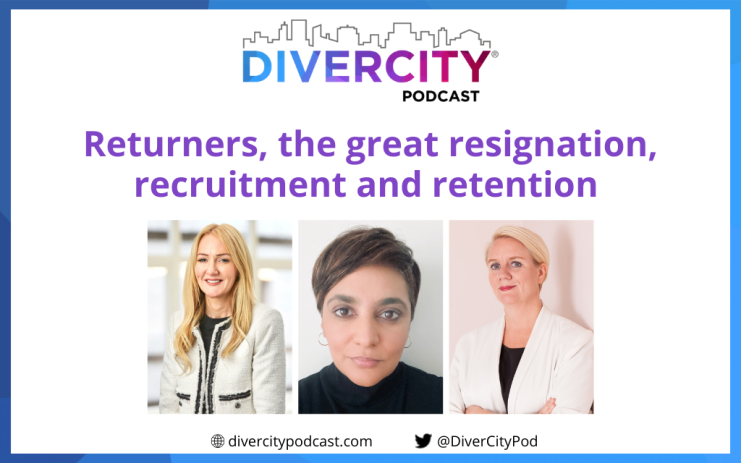
The Great Resignation can be the catalyst for employers to embrace diversity and inclusion

Some may view ‘The Great Resignation’ as a looming threat to businesses and careers, but others see it as an opportunity to improve recruitment standards and practices, leading to a more inclusive workforce that supports underrepresented individuals.
In a recent episode of DiverCity podcast, I was joined by Norma Gillespie, CEO of Resource Solutions, and Manisha Patel, an inclusion and culture advisor, non-executive director, and executive coach for both the private and public sectors.
The Great Resignation, spurred on by people seeking better working conditions, pay and flexibility in the wake of the pandemic, has resulted in huge volumes of recruitment activity, says Gillespie, but the opportunity to address long standing issues within recruitment is too great to ignore.
In particular, a focus on people returning to work has arisen following the pandemic through the Rejoin programme, a return-to-work programme, aimed at supporting and encouraging experienced professionals, who have had a break in their career.
“While it’s not exclusively focused on women, the facts are that women have been disproportionately hit by the pandemic in terms of employment, pay and opportunities,” notes Gillespie.
For Patel, her focus is broader, with society, inclusion and integration as areas she aims to change. Local communities and grassroots projects are the ideal places to begin asking how to build a society where people start integrating, she says. “How are we going to progress with diversity and inclusion in its truest sense?” It starts with breaking down social barriers, believes Patel.
The concept of ‘returners’, or people returning to the workplace after a significant period, is not new, but specific measures to encourage and support returners are more novel.
Goldman Sachs was cited as one of, if not the first financial services organisation to offer returnships – specific support programmes for people returning to a company – in 2008, although it took a while for the movement to cement.
Sadly, momentum has dissipated due to the pandemic, with numbers dropping – something that Gillespie views as a “real shame because the appetite is there.” However, it’s not seen by many organisations as being “business critical” right now.
Yet the groundwork has been laid for returners to view financial services organisations as being flexible, comments Gillespie, encouraging predominantly female workers to return. In particular, “wellbeing initiatives and the opportunity to progress” are catalysing growth in returnships in the US.
Building some form of mentoring or peer support network into the onboarding process is important, says Patel, but so too is implementing specific support measures for women reaching menopause. Citing a Standard Chartered research piece, Gillespie highlights that 25% of participants feel that reaching menopause “makes them more likely to leave their job, 22% say it makes them want to retire early, and 47% say they are less likely to even apply for a promotion.”
But Gillespie insists that equality, diversity and inclusion must remain high on the boardroom agenda to attract the best talent.
“The continuing war for talent isn’t going away. It’s getting fiercer every day,” she says, with candidates actively seeking “the kind of environment they want to work in.”